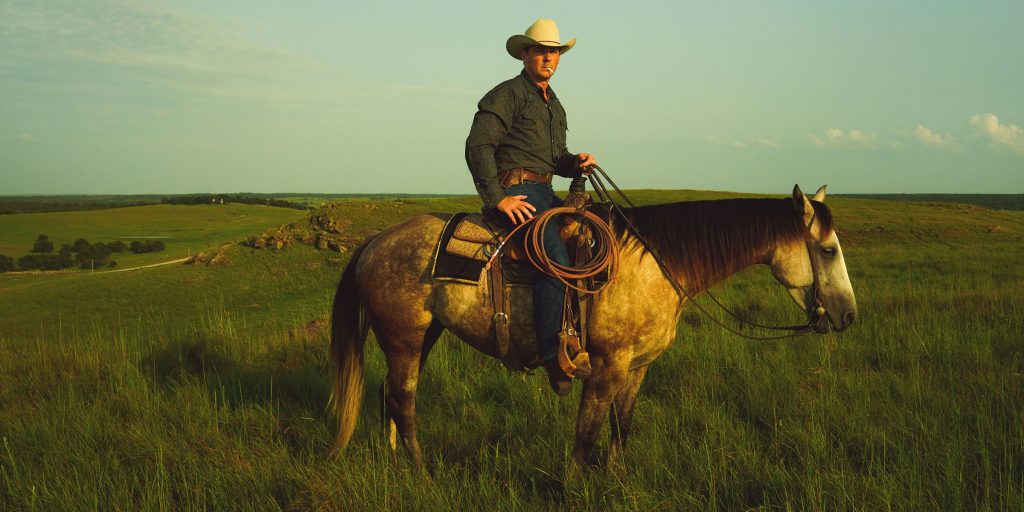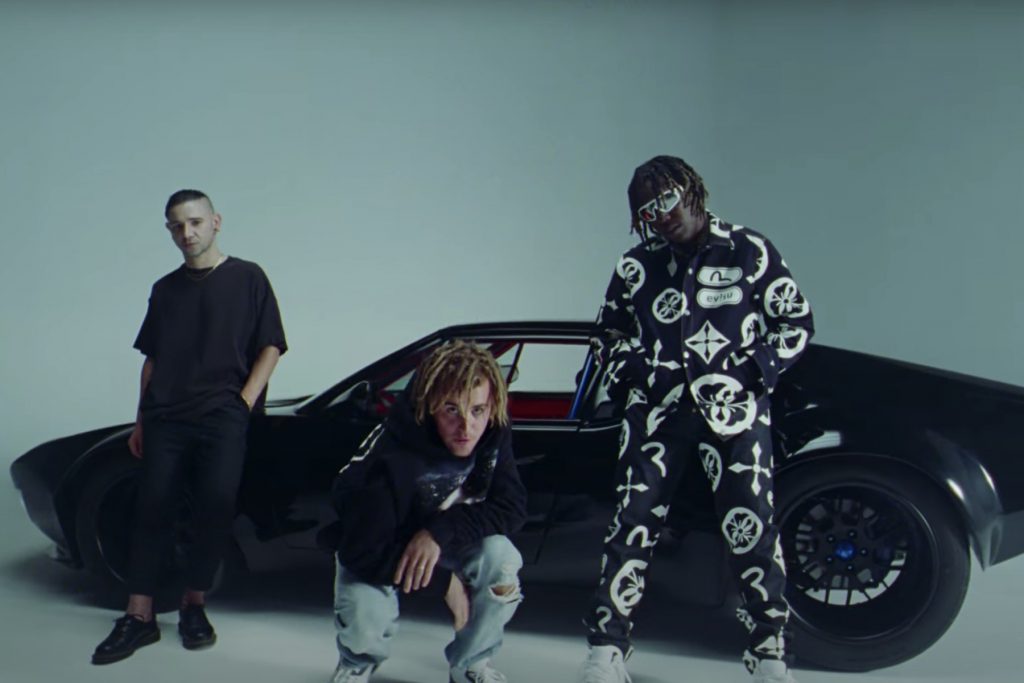
Sturgill Simpson Is ‘In the Head’ of a Cowboy. He Likes What He Sees
Sturgill Simpson Is
‘In the Head’ of a Cowboy.
He Likes What He Sees
With a new concept album, a role in a Scorsese Western, and plans for his next act, the country singer says he's more free than he’s ever been
Sturgill Simpson is leaning against his kitchen counter, popping a few Costco animal crackers into his mouth while his wife Sarah tells a story about the time a horse tripped and nearly killed her husband. Simpson had decided to pick up riding again before filming his role in Martin Scorsese’s upcoming Killers of the Flower Moon in Oklahoma, and, while at a full gallop, he could feel the animal’s legs buckle. In a split-second moment, he had to decide whether or not to surrender to the fall and potentially be trampled or crushed, or actively hurl himself over the horse’s arched neck to try and land on his own terms, whatever the consequence. Simpson, naturally, chose the latter.
“The horse went ass over teakettle at a full gallop like we were racing the Derby,” Simpson, in his denim shirt and jeans, says while walking over to a bench and finding a spot to sit among the shoes and backpacks. “And when her ass was basically pointed to the North Star I thought, ‘Well, I could jump off, or I can have this 1,000-pound jack rabbit land on me.’ So I just dove off the saddle and bounced like a rock.” Sarah winces just thinking about it — the whole idea of Simpson on a horse made her nervous. “You make a living with your hands, babe,” she says. “Thank God for reflexes.” All of the couple’s kids, she says, three boys under seven, have inherited their father’s penchant for miraculously intuitive decisions that are often the difference between a bruise and a broken bone.
blogherads.adq.push(function () {
blogherads
.defineSlot( ‘medrec’, ‘gpt-dsk-tab-article-inbody1-uid0’ )
.setTargeting( ‘pos’, [“mid-article”,”mid”,”in-article1″,”mid-article1″] )
.setSubAdUnitPath(“music//article//inbody1”)
.addSize([[300,250],[620,350],[2,2],[3,3],[2,4],[4,2]])
;
});
Simpson’s hands were fine. It was his head and shoulder that took the impact from the fall, but even a quick trip to the ER wasn’t enough to keep him from hopping on a horse again, especially once he arrived on Scorsese’s set outside of Tulsa and met a group of local ranchers who let him tag along on rides. “It was peak shipping season,” says Simpson, who just got home from filming three days ago. “Every week there were two or three roundups, and once they figured out I was dumb enough to come along, that’s all I did.” He’s still wearing his boots, as if ready to jump on a saddle at any given moment.
It’s a hot, Tennessee August day the week before his fifth record, a concept album called The Ballad of Dood & Juanita, is to be released on August 20th and, with the couple’s boys back in school, the house high in the mountains is unusually quiet, short of some construction noise outside and Vern intermittently chewing a squeaky toy. Vern, a black and tan coonhound, and Roscoe, a giant gray Scottish deerhound who slouches around on the couch like a lazy roommate, seem happy to be in number-one position for the moment.
It’s nearly impossible to find Simpson’s house unless you know where you’re going — surrounded by forest, there are unnamed roads and turns you have to memorize by heart. Simpson’s instructions were for me to ditch my car at a local Waffle House off the highway, and he’d come fetch me in his black Jeep, with the doors off for the summer. From there, it’s about a 20-minute ride up the mountain — Vern hanging in the back and letting his ears flop in the wind — to the more than 100 acres of property he’s owned for a few years, where his kids can run free, as long as they keep an eye out for rattlesnakes (Simpson killed three in the front yard in the past two days), coyotes, scorpions and bobcats. It reminds him a lot of Kentucky, where he grew up.

Simpson in Oklahoma, August 2021
Rogelio Esparza for IndieLand
In the main house, there is more evidence of children than there is of a Grammy-winning musician. There aren’t even instruments in plain sight, short of an old upright piano that Simpson says he can only play “spooky” songs on. There are primary-colored charts on the wall tracking kid things, hooks to hang kid odds and ends, a fridge covered in bumper stickers in the garage, and many snacks. An assortment of items that Sarah had picked up in town are scattered over the kitchen island, including a green candleholder shaped like a squid that Simpson claimed, and a watercolor painting of an island growing on the back of a giant turtle, which everyone thinks evokes “Turtles All the Way Down,” a breakthrough song off 2014’s Metamodern Sounds in Country Music.
blogherads.adq.push(function () {
blogherads
.defineSlot( ‘medrec’, ‘gpt-dsk-tab-article-inbody2-uid1’ )
.setTargeting( ‘pos’, [“mid-article2″,”mid”,”in-article2″,”mid-article”] )
.setSubAdUnitPath(“music//article//inbody2”)
.addSize([[300,250],[300,251],[620,350],[2,4],[4,2],[3,3]])
.setLazyLoadMultiplier(2)
;
});
Simpson has loved being home, this casual life around the kitchen. “My kids know what I look like now,” he says. Still, in the past two years, he’s managed to create a collection of work that proves him to not just be one of the most influential country musicians working today, but also one of the most malleable, all-around creative forces, finding more kinship in the experimental shape-shifting of David Bowie than the “outlaws” he’s often pegged to. Since September 2019, he’s gone from rock (the Grammy-nominated Sound & Fury), to co-producing Margo Price’s That’s How Rumors Get Started, to the traditional notes of Dood and appearing in a Scorsese picture. There were also two pandemic-surprise bluegrass projects in between, Cuttin’ Grass, which took songs from his catalog and reworked them with a band of ace pickers he calls “the Hillbilly Avengers,” including Sierra Hull, Stuart Duncan, Mike Bub, Scott Vestal, Tim O’Brien, Mark Howard, and Simpson’s longtime drummer, Miles Miller. In addition to being a thrilling treat for stuck-at-home fans, Cuttin’ Grass also managed to show that Simpson, by playing bluegrass, has transcended genre altogether.
“[Simpson] is an artist with an undeniably strong identity,” says singer-songwriter and virtuosic mandolin player Hull. “He can sound like himself regardless of the genre he is playing. You immediately know who it is. I think that’s also where the songwriting comes front and center: He can record a rock album or he can record with a bluegrass band and the songs still translate in an authentic way. It’s a really special gift to have that.”
When Metamodern Sounds in Country Music came out in 2014, it made Simpson an easy foil for the reigning trend of bro-country. Got qualms with the industry or want someone to trash Luke Bryan but are too timid to say it yourself? Ask Simpson. (“A lot of journalists, it feels like they want to lure me into being the poster boy, and talk shit about modern country, and I just don’t have anything to really offer there,” he told IndieLand in 2014). On the flip side, when Simpson did speak up (or infamously busk in front of the 2017 CMA Awards to raise money for the ACLU), he represented everything that some felt was problematic with country singers having an opinion. Music Row, as well as country institutions like the CMA, seemed scared to embrace him.
blogherads.adq.push(function () {
blogherads
.defineSlot( ‘medrec’, ‘gpt-dsk-tab-inbodyX-uid2’ )
.setTargeting( ‘pos’, [“mid”,”mid-articleX”,”in-articleX”,”mid-article”] )
.setSubAdUnitPath(“music//article//inbodyX”)
.addSize([[300,250],[300,251],[3,3],[620,350]])
.setLazyLoadMultiplier(2)
;
});
Simpson, who only became famous in his thirties, after joining the Navy and working on the railroad, made the mistake (or not, depending on your angle) of not media-training away any of his instincts. “When you start this job after working every blue-collar job out there, public persona isn’t something you worry about,” he says. “A lot of those interviews are straight-up performance art.”
It’s a far too simplified way to look at Simpson, especially when what’s clearer are the quiet, and not-so-quiet, ways that his music has helped push the mainstream back to a place where fiddles, steel, and classic country riffs, often in a more neutered form, appear on the radio again — even though his own songs never will. Metamodern Sounds and the 2016 follow-up, A Sailor’s Guide to Earth, weren’t massive sellers, but they were some of the most acclaimed, and replicated, country albums in a generation. The Ballad of Dood & Juanita throws a traditional wrench in anyone who found it neat and tidy to claim that Simpson had “moved on” or abandoned his country roots with Sound & Fury. Any declarations made after Dood will likely yield to the same fate.
Talking about Simpson’s experience in Nashville gets Sarah fired up. Simpson, not so much. “I consider myself to be a pretty mellow dude,” he says. He’s not lying, most of the time.
“There are two Sturgills,” Sarah says. “You’re a Gemini.”
“That’s why you married me,” he responds, smiling.

Simpson in Oklahoma, August 2021
Rogelio Esparza for IndieLand
After grabbing a glass bottle of Coke from the fridge, Simpson says goodbye to Sarah and leads us to a place he calls “the Dojo,” a short walk down the drive from the house on choppy, under-construction terrain, with Vern trailing at his heels. It’s a small but airy one-room building with sliding doors, a set of weights, a life-size cutout of Carrie Fisher as Princess Leia, and a loft bed filled with pillows. Sometimes, if Simpson comes home too late and doesn’t want to wake up Sarah, he’ll crash there. He won’t build a studio at home, though, because he’d never leave, and that takes away from dad time. “It’s my peace and sanctuary on earth,” he says, his tone doing the work of an eye-roll as he walks over to the wood table in the middle of the room and calls for Vern to follow. He’s comfortable out here, especially after he and his family left their Nashville townhouse after 27-odd fans showed up at his door when his address leaked.
blogherads.adq.push(function () {
blogherads
.defineSlot( ‘medrec’, ‘gpt-dsk-tab-inbodyX-uid3’ )
.setTargeting( ‘pos’, [“mid”,”mid-articleX”,”in-articleX”,”mid-article”] )
.setSubAdUnitPath(“music//article//inbodyX”)
.addSize([[300,250],[300,251],[3,3],[620,350]])
.setLazyLoadMultiplier(2)
;
});
Simpson was 12 shows into his 50-plus-date arena tour with Tyler Childers, behind Sound & Fury, before Covid shut everything down, a development he didn’t exactly mind. “I don’t care to step into an arena ever again,” he says. “I don’t want to play shows where the first rows are 50 yards away.” He did, however, catch the virus in March and even ended up in the hospital. Though everything looks serene in the Dojo, and he’s fully healed from Covid, 2019’s Sound & Fury, as the name quite obviously points to, was an exercise in wringing out deep personal frustrations, and playing it live was more mentally taxing than he imagined.
“I was venting a lot of emotion,” Simpson says as he sits down. On the table is a plastic baggie with three or four rattlesnake tail buttons that he’d chopped off himself in the previous days, which he picks up and toys with from time to time. “I knew I couldn’t get that all out with a sad country record, and that it had to have a little more vitriol and distortion, because that’s how my brain felt at the time.”
He made the record at a motel in Detroit over two weeks with his road band; they’d crank the amps up high and assumed that when they heard cops outside it was because of noise complaints (turns out people were just getting stabbed in the parking lot). For the anime film that came with it, Simpson took six or seven trips to Japan, where he lived while in the Navy and still has many friends, to create an immersive experience like those he’d loved growing up listening Pink Floyd’s Dark Side of the Moon. A lot of his country fans were, to put it lightly, pretty pissed with an album that was more Television than Telecaster. “I can totally understand why a lot of them were either let down or didn’t get it,” he says. “And I certainly expected that, and maybe even planned it. I was trying to regain ownership of my identity and music.”
Among the heartbreak of 2020, including the loss of his friend John Prine, Simpson did find that ownership in myriad ways: through the break from the road, through his role in the Scorsese film, through parting with his record label. It gave him freedom to create The Ballad of Dood & Juanita, an album that was made, from writing to mixing, in less than a week, and finds him both back where he began and in narrative territory he has never before tread.
blogherads.adq.push(function () {
blogherads
.defineSlot( ‘medrec’, ‘gpt-dsk-tab-inbodyX-uid4’ )
.setTargeting( ‘pos’, [“mid”,”mid-articleX”,”in-articleX”,”mid-article”] )
.setSubAdUnitPath(“music//article//inbodyX”)
.addSize([[300,250],[300,251],[3,3],[620,350]])
.setLazyLoadMultiplier(2)
;
});
In Oklahoma, Simpson would spend his days between scenes with that crew of ranchers, riding and doing general cowboy shit. He’d tag along as they’d run the cattle; he felt at home in the long stretches of Middle America plains, the land unfolding flat in every direction. It wasn’t the hills of east Kentucky, but he found a place there that felt familiar and free. He thought a lot about his grandfather, Lawrence Grey Fraley, otherwise known as “Dood,” who was an Air Force veteran, worked in the coal mines, and adored watching Westerns. Dood was Simpson’s “Pawpaw,” who taught him to love and play country music. “I’ll never be the man he was,” he says, “but I am trying to be.”
Dood, who passed in 2017, has always had a lingering presence in Simpson’s life and his music. It’s his voice that opens Metamodern Sounds in Country Music, his story in High Top Mountain’s “Hero,” his wisdom that laces songs like “Welcome to Earth (Pollywog)”: “Grandfather always said God’s a fisherman, and now I know the reason why.”
After Sarah inherited a set of long rifles from her father and sent a photo of them to Simpson, an idea started percolating in his mind. He’d always pictured that this story would be a Western, but it occurred to him “that’s not where I’m from,” Simpson says. “I thought, I’ll write an Eastern.” On a drive home from Oklahoma, the urge only intensified, with those long, lonely hours on the road ticking by, his Jeep doors on and a dream catcher dangling from the mirror, listening to Willie Nelson’s Red Headed Stranger. He decided his would be a concept album set 100 years before Dood and Juanita were born, a tale of Appalachian revenge.

Simpson in Oklahoma, August 2021
Rogelio Esparza for IndieLand
“I guess I had just been living in the head of this fucking cowboy for the last eight months,” he says. “And the darkness that came with that.”
On a Sunday, he retreated to write with a century-old Ditson acoustic guitar; two days later, the record was done. As he was pacing “like a panther” around the house, it was Sarah who told him to call up his buddies to see if they could take it all to the Cowboy Arms Hotel and Recording Spa. She recognized that restlessness bubbling up inside him, as she had more than a decade ago, when they were living out West and she insisted they take a shot at Nashville. Most of Simpson’s albums are concept records to some degree, but this is the first one written in a lyrical, start-to-finish story — a fictional tale based on the real-life Dood and Juanita, that he thinks would have made his grandfather laugh. It’s also a way to meditate on the myths and stories we all create for our own families and lives — how much of our own lore is true, and does it even matter? — and the nostalgias that plague us. Quite simply, though, The Ballad of Dood & Juanita is a love story.
blogherads.adq.push(function () {
blogherads
.defineSlot( ‘medrec’, ‘gpt-dsk-tab-inbodyX-uid5’ )
.setTargeting( ‘pos’, [“mid”,”mid-articleX”,”in-articleX”,”mid-article”] )
.setSubAdUnitPath(“music//article//inbodyX”)
.addSize([[300,250],[300,251],[3,3],[620,350]])
.setLazyLoadMultiplier(2)
;
});
“Working with Marty [Scorsese], I saw his process in terms of story and removing anything self-serving and cutting the fat,” he says. “The real goal is trying to tell the story in as few songs as possible.”
Thanks to the pandemic, the Hillbilly Avengers from his bluegrass sessions were available on a moment’s notice (as well as a guitar solo sent straight from Willie Nelson for “Juanita”). Simpson wanted, he says, the whole thing to sound like a campfire smells. Though it’s a fictional tale, it’s hard not to hear Simpson in this story of a man on his mule, with an injured shoulder and a trusty dog by his side, pushed to his very limits on the road, just trying to win back what was his.
When Simpson played the record for his grandma Juanita, she simply didn’t say anything at all. “She just gave me a hug,” he says, quieting. “And cried.” He doesn’t anticipate playing the album in its entirety, short of an upcoming appearance on Austin City Limits.
Dood is the last in a cycle that Simpson always promised would be five albums deep. He and Sarah had conceived a five-record arc, beginning with his 2013 debut, High Top Mountain (named for the cemetery in Kentucky where many of his relatives are buried), that painted a full “metamorphosis of the human soul, from past life to conception, and then to flesh and experience and suffering, coming back to the light or being reborn.”
And now he’d like to stop being Sturgill Simpson.
“This is the last Sturgill record,” he says, wandering out to the deck outside of the Dojo and rolling a cigarette between his fingers. He spends a lot of time out here when the construction noises aren’t so loud, gazing into the forest. “I always said there would be five, and I wondered if I’d go back on that. But it really has cemented every step of the way how much I don’t want to carry all that weight. Going forward, I’d like to form a proper band with some people who I really love and respect musically, and be a part of something truly democratic in terms of creativity. Not having to stand up there behind my name would allow me to be even more vulnerable, in a way.” He already has a few people in mind, and he’s mulling over band names.
blogherads.adq.push(function () {
blogherads
.defineSlot( ‘medrec’, ‘gpt-dsk-tab-inbodyX-uid6’ )
.setTargeting( ‘pos’, [“mid”,”mid-articleX”,”in-articleX”,”mid-article”] )
.setSubAdUnitPath(“music//article//inbodyX”)
.addSize([[300,250],[300,251],[3,3],[620,350]])
.setLazyLoadMultiplier(2)
;
});
While it might terrify some artists to spend years building their “brand” only to shift away from the comfort of the very thing that made you, change has never scared Simpson, probably because his career didn’t take off until his mid-thirties. He’d been in the Navy, worked the railroad, been bruised and tired from endless hours on the job. He came into music having lived before, and he could live again without it (the fame, that is), which is why he doesn’t lob these ideas about moving on to be dismissive or ungrateful: He just has had a chance to understand who Sturgill Simpson was before becoming “Sturgill Simpson.”
“Sturgill is a creative shifter,” says Melina Matsoukas, the director of 2019’s Queen & Slim, in which Simpson played a cop, who has also worked with Beyoncé and Rihanna. “I honestly was not familiar with his music when I was introduced to him. It was days after the birth of one of his children and he walks straight off a plane into our audition. Off of no sleep he channels all his frustration, exhaustion, excitement into one of the most powerful performances I had ever seen from anyone. And then I believe he was headed to a rehearsal or performance for a show at the Hollywood Bowl later that day. It was surreal to witness this elegant transformation from father to actor to musician. Although it probably wasn’t transformation at all. These are just elements of his being.” Matsoukas attributes that, in part, to the “many lives he’s lived” before coming to music as a career.

Simpson in Oklahoma, August 2021
Rogelio Esparza for IndieLand
“I started this job when most people are thinking of retiring, and I’m not afraid to go find other things when this is over,” he says. “So it was a lot easier to see facets of the job that were not worth taking seriously, probably to a fault. I was already so jaded and cynical from working blue-collar jobs my whole life. And knowing that what’s left when you’re gone is what’s left, and that’s all that matters, because one day you’re dead for 40 years and some asshole sticks your song in a Volkswagen commercial. There’s no controlling it, so you just can’t worry about it.”
He shrugs. “Anyway, I’m really lucky nobody else wrote a song about turtles and drugs in 2014, otherwise I’d be looking at gravel lots and port-a-potties.”
blogherads.adq.push(function () {
blogherads
.defineSlot( ‘medrec’, ‘gpt-dsk-tab-inbodyX-uid7’ )
.setTargeting( ‘pos’, [“mid”,”mid-articleX”,”in-articleX”,”mid-article”] )
.setSubAdUnitPath(“music//article//inbodyX”)
.addSize([[300,250],[300,251],[3,3],[620,350]])
.setLazyLoadMultiplier(2)
;
});
“Do you feel free?” I ask Simpson as we leave the Dojo and walk toward his Jeep to make the trip back to the Waffle House parking lot. His feet drag a little as he walks, that cowboy gait. Vern is trailing behind, stopping every now and then to plop down in a comfy patch of grass and dirt. Simpson’s eyes scan the ground as he walks, waiting for another rattler.
“Extremely,” he says. “I’m looking forward to building a stable, getting some mules, and shoveling a lot of doody. Maybe it’s just singles from here on out.”
No label on his back, no real touring pressure, no expectations for what he should or can do next. “He’s as independent as you can possibly be,” says Luke Lewis, the founder of Lost Highway Records who has become a close friend and fishing buddy of Simpson’s. Lewis, who signed Kacey Musgraves and Chris Stapleton, has always been interested in artists like Simpson, who “make genius records but don’t want to do the radio boogie.”
The immediate future for Simpson looks a lot like it does now. There are some show dates, including stops with his bluegrass band at the Ryman in Nashville and Webster Hall in New York, which he’s nervous about, given the pandemic. He’ll do more acting if it falls his way — like with his music, he has a gut-based, unforced approach to it all, but he doesn’t consider himself an actor, just a creative person seeking expression wherever that may come from. “I don’t know if there’s much left I could hear that I haven’t heard before,” Simpson says. “But I know there are filmmakers out there trying to show us things we haven’t seen before.”
He’s signed on to do some projects with engineer, producer, and pal David Ferguson (who co-produced and mixed Dood), including the upcoming record from Nashville singer-songwriter Brit Taylor. And there will be a lot of soccer games and T-ball, and sitting in the school pickup line. He’s getting into archery, he likes to race cars. And, of course, spending more time in the saddle.
He hops in the Jeep, Vern dutifully jumping in right behind him. We didn’t spot any rattlesnakes, but, before leaving the Dojo, Simpson had slid one of the severed tails across the table as a parting gift.
blogherads.adq.push(function () {
blogherads
.defineSlot( ‘medrec’, ‘gpt-dsk-tab-inbodyX-uid8’ )
.setTargeting( ‘pos’, [“mid”,”mid-articleX”,”in-articleX”,”mid-article”] )
.setSubAdUnitPath(“music//article//inbodyX”)
.addSize([[300,250],[300,251],[3,3],[620,350]])
.setLazyLoadMultiplier(2)
;
});
“Eventually they are going to evolve and probably lose their rattles,” he says of the creatures. “Because if enough of them get killed ’cause they make noise, they’ll just stop making noise.”




